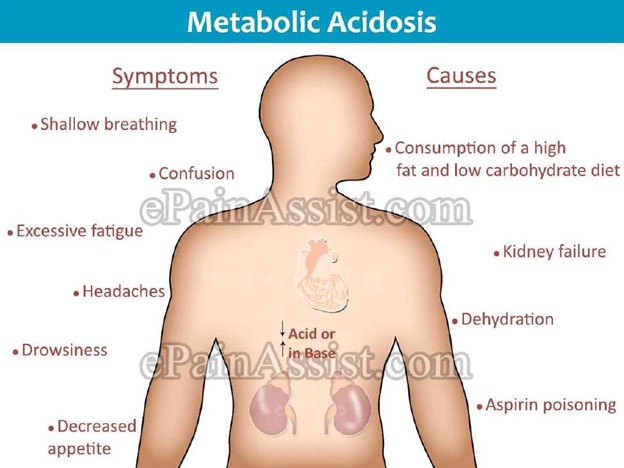A client is experiencing metabolic acidosis.
The nurse anticipates that the client’s respiratory rate will be:
Increased.
Decreased.
Normal.
Irregular.
The Correct Answer is A

Metabolic acidosis is a condition in which there is excess acid in the body fluids.
It causes rapid breathing, confusion, tiredness, headache, and increased heart rate.
Rapid breathing is a compensatory mechanism that helps to lower the carbon dioxide levels and increase the pH of the blood.
Choice B is wrong because decreased respiratory rate would worsen the acidosis by retaining more carbon dioxide and lowering the pH of the blood.
Choice C is wrong because normal respiratory rate would not be adequate to compensate for the metabolic acidosis and would result in acidemia (low blood pH).
Choice D is wrong because irregular respiratory rate is not a typical response to metabolic acidosis and could indicate other problems such as brain injury or drug overdose.
Nursing Test Bank
Naxlex Comprehensive Predictor Exams
Related Questions
Correct Answer is B
Explanation
Oliguria is the term for a urine output less than 400 mL per day. This can indicate dehydration, kidney failure, urinary obstruction, or other conditions that affect urine production.
Choice A is wrong because anuria is the term for a urine output less than 100 mL per day.
This is a more severe form of oliguria and can indicate complete kidney failure or urinary obstruction.
Choice C is wrong because polyuria is the term for a urine output more than 3000 mL per day.
This can indicate diabetes mellitus, diabetes insipidus, diuretic use, or excessive fluid intake.
Choice D is wrong because dysuria is the term for painful or difficult urination.
This can indicate urinary tract infection, kidney stones, bladder inflammation, or other conditions that affect the urinary tract.
Correct Answer is B
Explanation
Serum creatinine is a waste product that comes from muscle activity and is normally removed by the kidneys.
When the kidneys are damaged, the serum creatinine level rises.
The glomerular filtration rate (GFR) is a measure of how well the kidneys are filtering the blood and it is calculated from the serum creatinine level.
A normal GFR is 60 or more, while a GFR below 60 may indicate kidney disease.
Therefore, monitoring the serum creatinine level and the GFR can help assess the renal function in CKD.
Choice A is wrong because blood glucose level is not a direct indicator of renal function, although high blood glucose can damage the kidneys over time.
Choice C is wrong because serum albumin level is not a specific marker of renal function, although low serum albumin can be caused by protein loss in the urine due to kidney damage.
Choice D is wrong because white blood cell count is not related to renal function, but rather to immune system activity and infection.
Normal ranges for serum creatinine are 0.6 to 1.2 mg/dL for men and 0.5 to 1.1 mg/dL for women.
Normal ranges for GFR are 90 to 120 mL/min.
Normal ranges for serum albumin are 3.4 to 5.4 g/dL1.
Normal ranges for white blood cell count are 4,000 to 11,000 cells per microliter.
Whether you are a student looking to ace your exams or a practicing nurse seeking to enhance your expertise , our nursing education contents will empower you with the confidence and competence to make a difference in the lives of patients and become a respected leader in the healthcare field.
Visit Naxlex, invest in your future and unlock endless possibilities with our unparalleled nursing education contents today
Report Wrong Answer on the Current Question
Do you disagree with the answer? If yes, what is your expected answer? Explain.
Kindly be descriptive with the issue you are facing.
